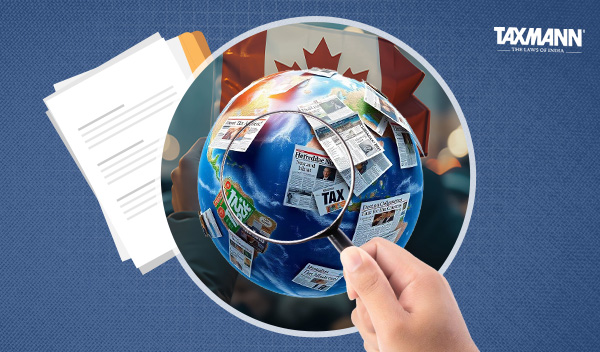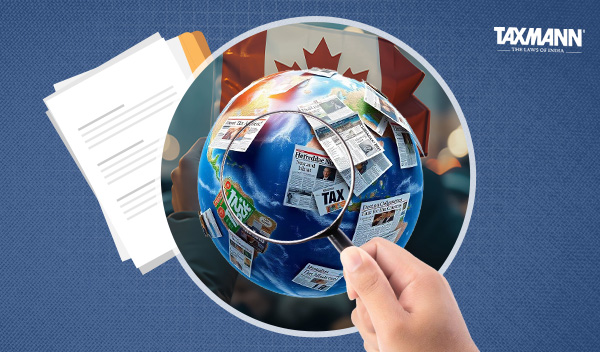
World Tax News provides a weekly snippet of tax news from around the globe. Here is a glimpse of the tax happening in the world this week:
1. Canada proposes amendments to the Global Minimum Tax Act
Canada’s Department of Finance has released draft legislative proposals for consultation that would implement several previously announced tax measures, including significant amendments to the Global Minimum Tax Act (GMTA). The proposed amendments, introduced through 13 clauses, are summarized below:
- Clause 1: Introduces and refines key definitions, including “private investment entity,” “recapture exception accrual,” and “unclaimed accrual,” to ensure consistency with OECD guidance.
- Clause 2: Clarifies residency rules for entities continued into jurisdictions without corporate income tax.
- Clause 3: Requires that GloBE inputs be converted using the reporting currency of the ultimate parent’s consolidated financial statements.
- Clause 4: Provides for the separation of MNE groups with private investment entities into distinct groups for GMTA purposes, with the addition of an anti-avoidance rule.
- Clause 5: Adjusts GloBE carrying values for assets affected by impairments or reversals.
- Clause 6: Clarifies that all amounts included in adjusted covered taxes are subject to the no-double-counting rule.
- Clause 7: Updates allocation rules for tax transparent entities, CFCs, and hybrid entities, and introduces the concept of a “specified jurisdictional effective tax rate.”
- Clause 8: Refines the calculation and allocation of deferred tax expenses and liabilities, including rules for push-down treatment and elections.
- Clause 9: Restricts recognition of deferred tax assets arising from pre-GloBE arrangements.
- Clause 10: Aligns the qualified domestic minimum top-up tax safe harbour with updated OECD guidance.
- Clause 11: Revises transitional CbCR safe harbour definitions, particularly with respect to qualifying income tax expense.
- Clause 12: Clarifies treatment of deferred tax assets from pre-GloBE arrangements and introduces exclusions and grace period rules.
- Clause 13: Amends the definition of “designated filing entity” to permit an eligible constituent entity, designated by the MNE group, to file the GIR on behalf of the group in place of the ultimate parent entity.
If enacted, the amendments would apply retroactively to fiscal years beginning on or after 31 December 2023. For further details, please refer to the [Legislative Proposals Relating to the Global Minimum Tax Act] and the [Explanatory Notes].
Source – Department of Finance Canada
2. Taiwan clarifies tax treatment of cross-border salaries for citizens working remotely in Taiwan for foreign employers
Taiwan’s Ministry of Finance has clarified that salaries earned by Taiwanese citizens who perform remote work in Taiwan for foreign employers are considered ROC-sourced income and must be included in Taiwan income tax filings.
How Are Cross-Border Salaries Taxed for Taiwanese Citizens Working Remotely in Taiwan for Foreign Companies?
With the rise of remote work and digital communication, many Taiwanese professionals now provide services to overseas employers while residing in Taiwan. When such services are performed within ROC territory, the compensation received constitutes ROC-sourced salary income and must be reported in the individual’s Taiwan income tax return.
The National Taxation Bureau of Kaohsiung, Ministry of Finance, explained that under Paragraph 3, Article 8 of the Income Tax Act, labor compensation earned by domestic residents for services performed within Taiwan qualifies as ROC-sourced income, regardless of the employer’s location or the account to which the salary is remitted.
For example, a Taiwanese software engineer engaged by a U.S.-based startup in 2024 to carry out remote development projects performed all work in Taiwan through video conferencing and email. Although the salary was deposited into the engineer’s U.S. bank account, the income is deemed ROC-sourced, since the services were rendered in Taiwan, and must therefore be included in the 2024 individual income tax return.
The Bureau further emphasized that income derived from overseas employers for services performed within Taiwan is not automatically reflected in income data available for taxpayer reference. Taxpayers who have under-reported or omitted such income for themselves, their jointly-filing spouses, or dependents may avoid penalties under Article 48-1 of the Tax Collection Act if they voluntarily file supplementary returns and pay the tax with interest before discovery or investigation by the authorities.
For further assistance, taxpayers may call the Bureau’s toll-free service hotline (0800-000-321) or visit its official website (https://www.ntbk.gov.tw) to consult the National Tax Smart Assistant “National Tax Helper.”
Source – Ministry of Finance, R.O.C.
Click Here To Read The Full Article
The post World Tax News: Canada Proposes Amendments To Global Minimum Tax Act appeared first on Taxmann Blog.

